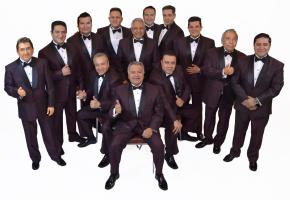Into Argentina's top television studios they strut, bearing great shoulder pads and tossing their waist-long curls, as if they were parading the low-class streets they habitually rule. The electronic dance rhythms begin, girls in glittering mini-skirts sway their hips, a five year old performs astonishing pelvic thrusts, and the chubby quintet springs into routine.
They are not the tall, suave, fair specimens for which Argentina is proud and famous in Latin America. They are the short, pudgy dark-skinned "bailanteros" of the country’s vast interior which Buenos Aires always tried to conceal.
The capital's middle class is appalled at the "grasas" (greasy people) they say are disgracing prime time TV hours in multi-coloured dream-coats and polluting the airwaves with their tropical pop. This circus, they thought, could only be found in Peru, Colombia and other "less sophisticated" Latin countries.
Yet the unbecoming performers are the nation's new idols. As they watch them on Saturday afternoon TV, thousands of families across the country imitate the banal dance steps in their living rooms. As the coffee-skinned boys wink, pout and mime their song, tears come streaming down the cheeks of screaming teenage girls in the studio audience. Hundreds more cry for a kiss at the weekend Bailantas (Cumbia discos), when they appear live in more daring cowboy pelvis-less pants.
For years the national media, generated in European-looking Buenos Aires, ignored the Andean and northern tropical provinces where Argentina's Cumbia - a copy of Colombian popular culture- began. Many hardly new it existed. But the recent cumbia invasion on the capital marks the revenge of the "other Argentina". Immigrants from Bolivia and Peru and provincial folk who came to the big city for work, only to find unemployment and discrimintaion have found solace in their musical affinity.
Argentine Footballer Carlos Tevez dances cumbia
That their cultural caprices have been vindicated is thanks to the post-dictatorship market economy. It began to boom under the populist politics of President Carlos Menem, himself a provincial man. in the 1990s. Entrepreneurs discovered the profit to be made out of popular culture and tempted the big media groups away from prejudice.
Now, Buenos Aires snobs were forced to face a reality they denied: that they live not in Europe but in Latin America.
"Before, nobody wanted to see the 'negritos' (indigenous looking people) on television." says Kuki Pumar, whose sartorial gold trophies the 230,000 CDs his bailanta record label, Leader, sells each month. "Music multinationals were only targeting the five million most wealthy. Nobody was giving the other 28 million Argentines what they wanted."
They soon learnt. When the popular TV Guide Teleclic gave a free CD from Leader's label with its copies, its sales rose from 30,000 to 200,000. With its Saturday bailanta show, Channel 2, the channel with lowest rating, is watched by 1.5 million viewers and become the highest.
Gone are the days when the poor of the interior aspired to glamourous Buenos Aires society. In its tango era, Evita came to climb it. It's literary and theatre tradition, bearing eminent writer Jose Luis Borges and the Colón opera house, was nationally revered. In the 70s, provincial populations scrutinized its psycho-analyzing intelligencia for the coming of a new Che Guevara. Even up to five years ago, psycho-analysis was considered a status symbol and ninety-five per cent of pop music played on radio stations was English or a local copy of it.
But the new generation, rather than persist at the unwelcoming doors of the chic Euro-wannabe Buenos Aires venues, where they are often turned away for their dark complexions, now stick to the bailanta discos where Pumar's perfomers make them feel at home. "After a week of work and humiliation, they want to spend the little money they have on the little things that make them feel good; a bar-b-q, wine, and a dance." says Pumar. "That is the demand we have captured"
But is not just the poor and oppressed who go for the "greasy" music. A new kind of sun-bedded Argentine yuppie has emerged out of the liberal economy- one who does business with Mexican media tycoons, is more at ease with Latin sass than European sophistication and prefers the Miami jet-set scene to the old posing playground of Paris.
Their teenage children play cumbia at top volume as they drive their sports cars in the seaside resorts. In the night clubs models and football stars dance to it as they pose for magazines.
Even middle class kids have been touched by the tropical plague, much to parental horror. That their daughters throw their hearts at the "greasy" men, adds to parents painful awareness of the financial crisis haunting them; the fear they are slipping into the status of great unwashed they were taught to look down on.
Lead singer Cello of top bailanta group Green, is bemused at the reaction. "I don't know why I'm so popular. I am not white like you," he says, adding as he places his hand on his proudly exposed, hairy pecks. "It must be the feeling."
The feeling is contagious, apologizes Martín Tacuarí, an out-of-work engineer condemned to taxi-driving. Like most Argentines, he used to listen to European pop-Morrisey and The Cure were his favourites, but these days they don't help lift his down-trodden spirits. "Besides, we can't pretend anymore. We are simply more romantic than you people in Europe."
Now that populist values have set in, for the first time Argentina's Europhiles once considered superior, are being made to feel the outcasts. "Look at them," sneered a cumbia fan at a rave for the elite, featuring guest DJs from Germany, "they are just people who want to live in Europe but don't have the money. Europe is finished, saturated, It is all just beginning here."
With its new sense of Latin American solidarity and euphoria, Argentina looks set to reverse the bad reputation it made itself as the continent's snobbiest country. It is even promising to aport its own Latin sass; a cumbia mutant played by slinky Argentine men with high-lighted and ironed hair.
But while Evita’s cabecitas negras (dark-skinned masses) are finally in the commercial spotlight, (a legacy of European aspirations) the business hides exploitation.
From the sidelines of the television studios shady characters who call themselves "managers" hover over their groups, in shiny double-breasted suits and ears glued to mobile phones. Many of them allegedly refuse to pay immigrant musicians and threaten that they'll get them deported on imprisoned if they leave.
One of the most loved cumbia heroes, Carlos Chavez (not related despite physical similarities to the Venezuelan president), was recently murdered. His manager, who brought in immigrant bailanteros illegally and kept them in a big house with his 12 wives, is on the run from police.
Yet, as long as the TV lights glamorize the cheap world, the girls continue to cry. And Argentina's capitalist-democracy revels in a surreal celebration of its new-found Latin identity, discovered through a previously criminal concept: what the people want.
This article was first published in 2004. To find out about how Cumbia then became a global explosion aswell as Latin America's most popular music, check out our next issue on Latin Music...coming soon!.
















